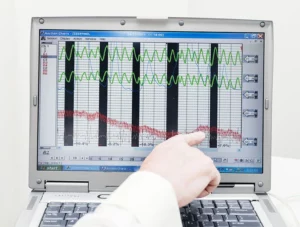Polygraph tests work by measuring physiological responses that include heart rate, blood pressure, and breathing patterns to determine whether you are truthful or deceptive. They are often perceived as uninfluenced by external factors, but in reality, results can be influenced by many, including medical conditions. Understanding how they can affect results is crucial for ensuring accurate outcomes.

Medical conditions such as cardiovascular disorders, respiratory disorders, and neurological disorders can impact the physiological responses measured by polygraphs, leading to inaccurate findings. Medications can also affect these, so it is essential to be aware of these potential influences and take them into account.
In this article, we will explore the impact of medical conditions on polygraph tests and their potential implications.
Cardiovascular disorders and their effects on polygraph tests
Cardiovascular disorders are conditions that affect the heart and blood vessels, including heart disease and hypertension. These can have a major impact on polygraph results since they measure heart rate and blood pressure.
Heart disease
Heart disease is a broad term that encompasses several different conditions, including coronary artery disease, heart failure, and arrhythmias. These can cause changes in the heart’s electrical activity, which can affect the heart rate measured by a polygraph. An individual with heart disease may have a lower than average heart rate variability, which means that their heart rate does not fluctuate as much in response to different stimuli. This can also be misinterpreted by the examiner as a sign of deception or stress. Additionally, medications used to treat heart disease, such as beta blockers, can also affect heart rate and blood pressure, further impacting the accuracy.
Hypertension
Hypertension, or high blood pressure, is another cardiovascular disorder that can impact lie detectors. An individual with hypertension may have an elevated baseline blood pressure that is higher than the average person’s. During a polygraph, the examiner may interpret this elevated value as a sign of deceit or stress, even though it is simply a result of the individual’s underlying medical condition. Similarly, medications used to treat hypertension, such as calcium channel blockers, can also affect heart rate and blood pressure.
Studies about cardiovascular disorders and polygraphs
Several studies examined the impact of cardiovascular conditions on the accuracy of polygraph tests. One found that individuals with heart disease had higher rates of false positives, indicating that they were classified as lying when they were actually telling the truth. Another study found that those with hypertension had higher rates of false positives and false negatives, indicating that the accuracy of the test was compromised.
It’s worthwhile to keep in mind that not all individuals with cardiovascular disorders will experience significant changes in their physiological responses during the exam. The severity of the condition and your reaction to treatment are highly different from one another. However, if you are an examiner, it is vital for you to be aware of these potential influences.
Respiratory disorders and their effects on polygraph tests

Respiratory conditions such as asthma, chronic obstructive pulmonary disease (COPD), and emphysema can affect polygraph test results by altering the breathing rate, tidal volume, and carbon dioxide levels in the body. These disorders can cause you to have difficulty breathing, resulting in changes in your respiration patterns that may be interpreted as deceptive responses.
You may also be required to use inhalers or other breathing devices to manage your symptoms, which can further affect breathing patterns. These devices may cause fluctuations in respiratory rate and tidal volume, which can, in some cases, lead to inaccurate results.
In addition, excessive anxiety and stress related to taking a polygraph can exacerbate respiratory symptoms for individuals with respiratory disorders. It can cause them to have even more difficulty breathing, resulting in further changes in breathing patterns that may be misinterpreted as deceptive responses.
Asthma
Asthma is a respiratory condition characterized by inflammation and narrowing of the airways, leading to symptoms such as shortness of breath, wheezing, and coughing. This condition can have considerable effects on the physiological responses that are measured during a polygraph test.
Firstly, individuals with asthma may experience increased respiratory rate and depth, which can lead to hyperventilation. Hyperventilation can result in decreased levels of carbon dioxide in the blood, causing changes in heart rate and blood pressure that possibly be misinterpreted as indicators of deception.
Additionally, asthma can also cause increased anxiety, which, as mentioned, can also affect physiological responses. Anxiety can cause increased sympathetic nervous system activity, which leads to increased heart rate and blood pressure as well as decreased skin conductance.
Furthermore, those with asthma may be taking medications such as bronchodilators and corticosteroids, which can also affect physiological responses. For example, bronchodilators can increase blood pressure, while corticosteroids can affect blood glucose levels, which can affect skin conductance.
As with other conditions, the severity of the effects varies depending on the individual and the extent of their asthma.
Chronic obstructive pulmonary disease (COPD)
Chronic obstructive pulmonary disease (COPD) is a progressive lung disease that makes it difficult for you to breathe. COPD includes two main conditions: chronic bronchitis and emphysema. This condition can also have a substantial impact on the physiological responses that are measured during the polygraph test.
When you have COPD, the air passages in your lungs become narrowed, and your air sacs lose their elasticity. This means that your lungs can’t take in as much air as they used to. As a result, you may experience shortness of breath, wheezing, and coughing. These symptoms can be triggered by physical activity, respiratory infections, or exposure to certain irritants, such as cigarette smoke or air pollution.
During a polygraph, the examiner measures your bodily reactions to different stimuli. However, if you have COPD, these responses may be affected by your lung function.
For example, when you have trouble breathing due to COPD, your body may compensate by breathing faster or shallower. This can cause your respiration rate to be higher than normal during the test, which could be considered as a sign of lying. Additionally, if you experience shortness of breath or coughing, this can also affect your other physiological responses and lead to inaccurate results.
Studies about respiratory disorders and polygraphs
Studies have been conducted to investigate the effects of various respiratory disorders on polygraph test results. For example, one published in the Journal of Forensic Sciences in 2002 examined the effects of asthma. The study found that asthmatic subjects had significantly higher breathing rates during the test, which could potentially interfere with the accuracy. The study also found that asthmatic subjects were more likely to experience responses that could be interpreted as deceit, such as increased heart rate and skin conductance.
Another study published in the same journal in 2004 looked at the effects of COPD. The study found that COPD patients had significantly higher baseline respiratory rates and were more likely to experience respiratory-related physiological responses during the test. This could make it more difficult to distinguish between deception and the effects of the disorder.
Sleep apnea has also been studied in relation to polygraphs. A 2009 study published in the journal Sleep found that subjects with obstructive sleep apnea had higher baseline heart rates and lower skin conductance responses compared to control subjects. The study suggested that these physiological differences could potentially affect accuracy.
It’s worthwhile to keep in mind that these studies are limited in scope, and further research is needed to fully understand the effects of respiratory disorders on polygraphs. However, they do suggest that they can potentially interfere with the procedure.
Neurological disorders and their effects on polygraph tests

When it comes to neurological disorders, the use of polygraphs can be particularly complicated. As they are designed to measure responses that can all be affected by certain neurological conditions.
For example, individuals with epilepsy, traumatic brain injury, and multiple sclerosis may experience frequent changes in their autonomic nervous system, which can all cause alterations that could be misinterpreted by a polygraph.
In addition, medications used to treat neurological disorders, For instance, those used to treat Parkinson’s may cause tremors, while drugs used to treat anxiety or depression tend to affect heart rate and respiration.
Furthermore, the use of polygraphs in legal and employment settings for individuals with neurological disorders may raise questions about discrimination and potential violations of the Americans with Disabilities Act.
Attention deficit hyperactivity disorder (ADHD)
ADHD, or Attention Deficit Hyperactivity Disorder, is a neurological condition that affects people of all ages. It is characterized by symptoms such as impulsivity, hyperactivity, and inattention. While the disorder can be managed with medication and therapy, it can still cause challenges in regards to polygraph tests.
Individuals with ADHD may experience different physiological responses despite telling the truth, which can potentially lead to false positives.
Research has shown that individuals with ADHD may have higher heart rates and more fidgeting than those without the disorder. These might be interpreted as signs of deception. Additionally, those with ADHD may also have difficulty focusing and following instructions during the test, further complicating the results.
Post traumatic stress disorder (PTSD)
Post-traumatic stress disorder (PTSD) is a mental health condition that may develop among those who experienced or witnessed a highly traumatic event. Many with PTSD have difficulty recalling memories, especially when it comes to the details of those events. This can be problematic when it comes to taking a polygraph test, which relies heavily on accurate memory recollection.
Research on the use of polygraphs for those with PTSD is limited, but some suggest that the accuracy may be compromised in this population. For example, a study published in the Journal of Forensic Psychiatry & Psychology found that individuals with PTSD were more likely to produce false positives. The study also found that those with PTSD were more likely to experience physiological arousal during the test, which could most definitely impact the accuracy.
Another study published in the Journal of Anxiety Disorders found that individuals with PTSD were more likely to experience anxiety during a polygraph. The study also suggested that PTSD may lead to an overreaction of the sympathetic nervous system, which could lead to false positives.
Illness and its effects on polygraph tests (colds and flu, headaches, fever)

Similar to the conditions discussed above, illness can affect physical responses, which are the basis for polygraph testing. For example, if someone has a fever or is experiencing pain, their heart rate and breathing patterns may be different than usual. This could potentially impact the results.
In addition, certain medications can also affect outcomes. For example, drugs that affect the central nervous system, such as anti-anxiety medications, can alter heart rate and breathing patterns.
It’s also worth noting that illness and stress often go hand in hand. The stress of illness or chronic pain can affect mental state, potentially leading to increased anxiety or difficulty concentrating, which impacts readings as the test relies on a person’s ability to remain calm and focused.
Final Words
Understanding the potential impact of medical conditions on polygraphs is especially important for both test-takers and administrators. By being aware of these factors and taking appropriate measures, the accuracy and reliability of the test can be maximized, and the potential for inaccurate results can be minimized.
I hope your test is fair and accurate!

